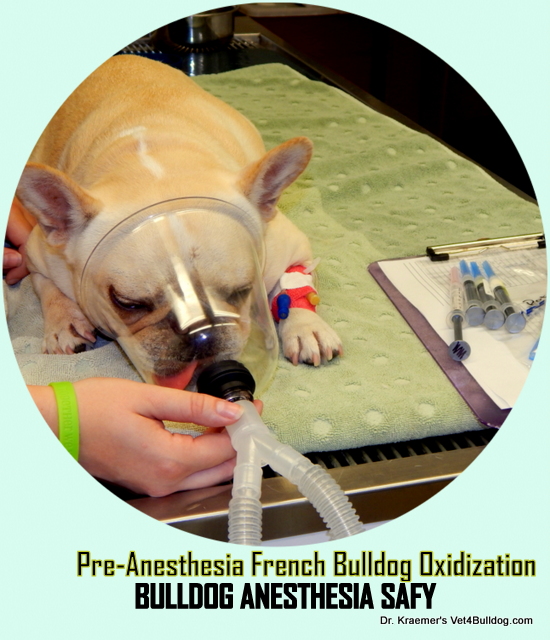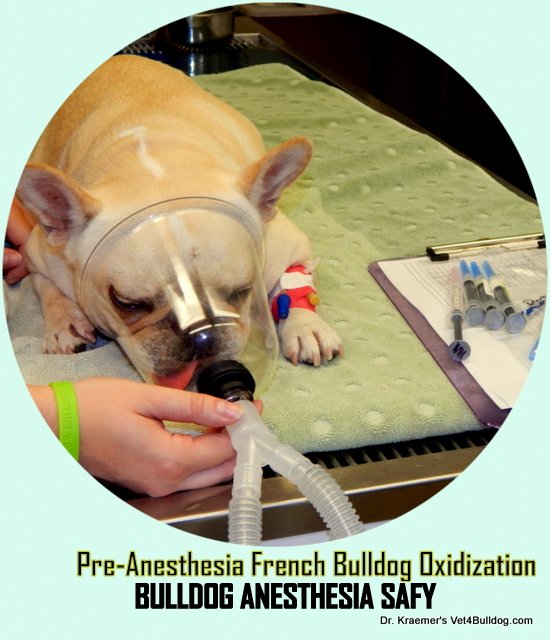Anesthesia is a critical aspect of veterinary medicine, but when it comes to certain breeds like the French Bulldog, there are concerns about safety. French Bulldogs have a unique anatomy, with their short snouts and compact airways, which can make anesthesia riskier for them. So, is anesthesia safe for French Bulldogs? Let’s dive into the topic to understand the potential risks and precautions associated with anesthesia for this beloved breed.
French Bulldogs are known for their charming looks and playful personalities, but they also have a higher risk of complications during anesthesia compared to other breeds. With their brachycephalic features, French Bulldogs can be prone to respiratory issues, making anesthesia more challenging. Additionally, their smaller trachea and narrow nostrils can contribute to breathing difficulties and an increased risk of airway obstruction under anesthesia. However, advancements in veterinary medicine and careful monitoring during anesthesia have significantly improved safety for French Bulldogs. Veterinarians who specialize in anesthesia and have experience with brachycephalic breeds can ensure that these adorable companions receive the best care possible while minimizing any potential risks.
Ensuring the safety of French Bulldogs during anesthesia is crucial. Before administering anesthesia, a thorough pre-anesthetic evaluation should be performed to assess the dog’s health and identify any potential risks. Additionally, using modern anesthetic protocols tailored to the breed’s specific needs can help minimize risks. Continuous monitoring of vital signs during anesthesia is also essential. By following these precautions, anesthesia can be safe for French Bulldogs and allow for necessary medical procedures to be performed.

The Safety of Anesthesia for French Bulldogs
When it comes to the health and well-being of our furry friends, it’s natural to have concerns about their safety, especially when it comes to medical procedures such as anesthesia. French Bulldogs are popular pets known for their distinctive appearance and friendly personalities. If you are a French Bulldog owner, you might wonder if anesthesia is safe for your four-legged companion. In this article, we will explore the topic of anesthesia safety for French Bulldogs and provide you with the information you need to make an informed decision.
Understanding Anesthesia
Anesthesia is a medical procedure that involves administering drugs to induce a loss of sensation and temporary unconsciousness. It allows veterinarians to perform surgeries, dental procedures, and other treatments without causing pain or distress to the animal. While anesthesia is generally safe when administered correctly and monitored closely, there are always potential risks involved, especially for certain breeds, including French Bulldogs.
Factors that Affect Anesthesia Safety
Several factors can influence the safety of anesthesia for French Bulldogs. Some of these factors include:
- The age and overall health of the dog
- Any pre-existing medical conditions
- The specific anesthesia drugs used
- The dosage of the drugs
- The length of the procedure
- The expertise and experience of the veterinarian and their team
It’s important to discuss these factors with your veterinarian before any procedure involving anesthesia. They will be able to assess your French Bulldog’s individual health condition and determine the best approach to ensure safety.
Potential Risks and Complications
While anesthesia is generally safe, there are some potential risks and complications that can arise, especially for brachycephalic breeds like French Bulldogs. Some possible risks include:
- Respiratory issues: Brachycephalic dogs have shorter airways, which can make intubation and breathing under anesthesia more challenging.
- Heat intolerance: French Bulldogs are prone to overheating, and anesthesia can increase the risk.
- Anesthetic reactions: Some dogs may have adverse reactions to certain anesthesia drugs.
- Weight gain: Prolonged inactivity during the recovery period can lead to weight gain in French Bulldogs, which can worsen their existing health conditions.
It’s essential to address these risks with your veterinarian and discuss strategies to minimize them. They may recommend additional monitoring, adjust the anesthesia protocol, or take other precautions to ensure the safety of your French Bulldog.
Preparation and Monitoring
To maximize the safety of anesthesia for your French Bulldog, thorough preparation and close monitoring are crucial. Here are some steps your veterinarian may take:
- Pre-operative blood work: Blood tests can help identify any underlying health issues that may increase the risk of complications.
- Pre-anesthetic examination: A physical examination allows the veterinarian to assess your dog’s overall health and suitability for anesthesia.
- Intravenous (IV) catheter placement: An IV catheter allows quick access to administer fluids and medications during the procedure.
- Anesthetic monitoring: Monitoring equipment such as blood pressure monitors, pulse oximeters, and ECG machines help track your dog’s vital signs throughout the procedure.
- Temperature regulation: Special care is taken to ensure your dog’s body temperature is maintained during anesthesia, as French Bulldogs are sensitive to heat.
By following these measures and maintaining open communication with your veterinarian, you can help ensure the safe administration of anesthesia for your French Bulldog.
Post-Anesthetic Care and Recovery
The recovery period after anesthesia is vital for your French Bulldog’s well-being. During this time, it’s important to follow your veterinarian’s instructions for post-anesthetic care, which may include:
- Keeping your dog in a quiet and comfortable environment
- Restricting activity to prevent injuries
- Monitoring for any signs of complications or discomfort
- Administering prescribed medications as instructed
- Scheduling follow-up appointments to ensure proper healing
By providing the necessary care and monitoring during the recovery period, you can help ensure a smooth and safe transition for your French Bulldog.
Conclusion
Anesthesia can be safe for French Bulldogs when proper precautions, preparation, and monitoring are in place. However, it’s essential to have open and honest communication with your veterinarian and discuss any concerns you may have. They will be able to assess your dog’s individual circumstances and provide the best possible care to minimize any potential risks. With the right approach and expertise, you can proceed with necessary procedures, knowing that the well-being and safety of your French Bulldog are a top priority.
Key Takeaways:
- Anesthesia can be safe for French Bulldogs when administered by a professional veterinarian.
- French Bulldogs have unique anatomical traits that require careful monitoring during anesthesia.
- Prior to anesthesia, a comprehensive health evaluation should be conducted to assess any potential risks.
- Choosing a veterinarian experienced with brachycephalic breeds is crucial for anesthesia safety.
- Proper post-operative care and monitoring are essential for a successful recovery after anesthesia.
Frequently Asked Questions
Anesthesia is a necessary part of many medical procedures, including those performed on French Bulldogs. It is important for pet owners to understand the safety and precautions involved when using anesthesia on their furry friends. Here are some frequently asked questions about the safety of anesthesia for French Bulldogs.
1. What types of anesthesia are used for French Bulldogs?
There are different types of anesthesia used for French Bulldogs, depending on the procedure and the individual dog’s needs. General anesthesia is commonly used, which involves administering medications to induce a loss of consciousness and prevent pain during surgery or dental procedures. Local anesthesia may also be used to numb a specific area while keeping the dog awake.
It is important to note that the type and dosage of anesthesia will be determined by a veterinarian based on the dog’s health, age, and the specific procedure being performed.
2. Is anesthesia safe for French Bulldogs?
When performed by a skilled veterinarian and with proper precautions, anesthesia is generally considered safe for French Bulldogs. However, the risks associated with anesthesia can vary depending on factors such as the dog’s overall health, age, and any underlying medical conditions.
It is important for pet owners to inform the veterinarian about their French Bulldog’s medical history, including any previous adverse reactions to anesthesia. Additionally, pre-anesthetic bloodwork and a thorough physical examination will help assess the dog’s suitability for anesthesia.
3. What precautions should be taken before anesthesia?
Prior to administering anesthesia, the veterinarian will conduct a comprehensive assessment to ensure the French Bulldog is a good candidate for the procedure. This may include blood tests, X-rays, and other diagnostic tests to evaluate the dog’s overall health.
It is essential for pet owners to follow the veterinarian’s instructions regarding fasting before the procedure. This helps reduce the risk of aspiration, which occurs when stomach contents enter the airway during anesthesia.
4. What happens during the anesthesia procedure?
During anesthesia, the French Bulldog is carefully monitored throughout the procedure. This includes monitoring vital signs such as heart rate, respiratory rate, blood pressure, and oxygen levels.
The anesthesia team will administer medications to induce and maintain anesthesia, as well as provide pain management. They will also ensure the dog’s body temperature is maintained and protect the airway to prevent any complications.
5. What are the risks of anesthesia in French Bulldogs?
While anesthesia is generally safe, there are potential risks involved, especially for brachycephalic breeds like French Bulldogs. These risks can include respiratory issues, cardiovascular problems, and a higher sensitivity to anesthesia. It is important to closely monitor the dog during the procedure and follow all post-anesthetic care instructions.
Remember, it is crucial to trust and work with a qualified veterinarian who has experience in administering anesthesia to French Bulldogs.

In summary, anesthesia can be safe for French Bulldogs when proper precautions are taken.
It is important to choose a veterinarian experienced in working with brachycephalic breeds and to conduct pre-anesthetic testing to assess the dog’s overall health. Close monitoring during anesthesia and the use of appropriate drugs and techniques can further minimize risks. While there is always a small inherent risk with anesthesia, the benefits of necessary procedures may outweigh the potential risks for a French Bulldog’s health and well-being.
